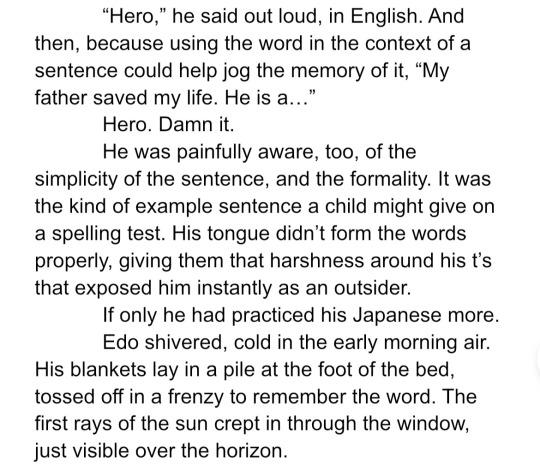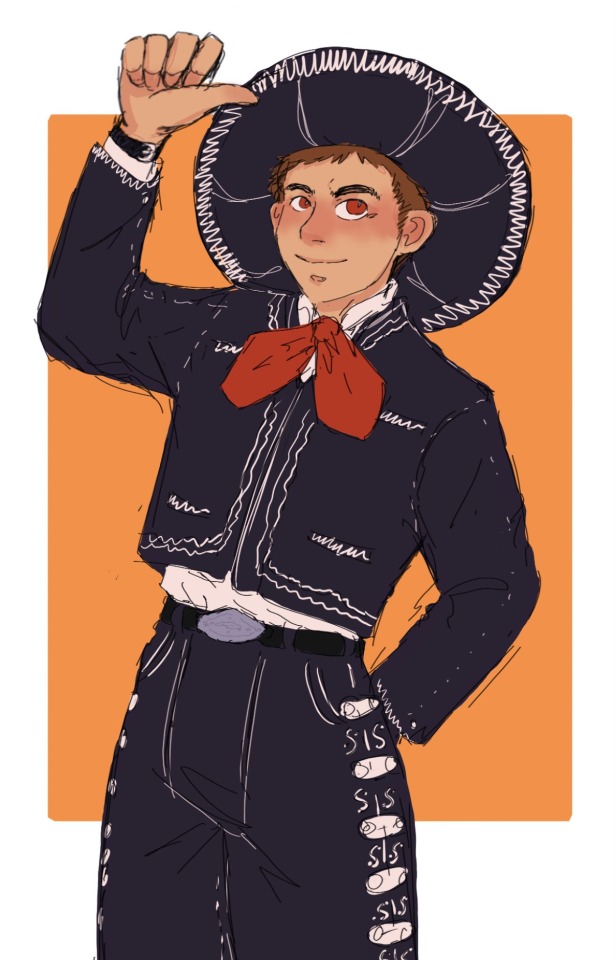#heritage speaker
Text
Fun fact: When I am tired/sick/having any amount of trouble with words, "walizka" comes to me way faster than "suitcase" even though I mostly think and speak in English.
#seems to be more random with other words and it goes both ways (though my English vocabulary is larger so even when not tired I might circle#but there's something consistent about suitcases#and I am not sure why#enough Polska trips as a kid?#heritage speaker#languages
3 notes
·
View notes
Text
My grandfather immigrated from France to America, my father's a heritage French speaker. His first language was French, he almost exclusively spoke French at home, and he lived in a French immigrant neighborhood as a child
Then he married my mother, moved out, and had children. His father moved to a different state, my father then lived in a neighborhood where there were zero French speaking people. He stopped practicing French and nearly thirty years later (today) he now struggles to speak French
None of my siblings, including me, speak French. It was just not what we did in our house, though my mom spoke French as well. There has been a noticable language barrier at times with my grandfather
I now date a heritage Spanish speaker who has lived in neighborhoods where people spoke Spanish, gone to schools where people also know Spanish, etc. At times I wonder if we were to get married and have children, would his parents have a similar barrier with their grandchildren that I have with my grandfather?
I almost feel guilty when I think about it, but it is incredibly irrational. I just wonder if this is a shared experience for anyone else who dates someone from a different culture
#personal#language barrier#french language#Spanish language#interracial relationships#heritage speaker#loss of language#monolingual#bilingual#interracial couple#relationships#dating#intercultural#languages#language#communication#family
3 notes
·
View notes
Text
i need to learn brazilian portuguese asap
0 notes
Text
Esperanto writing practice 1
Source for question: https://relearnalanguage.com/language-exchange-topics-vocabulary-builders/
How do you define a “heritage speaker”? What are the limits of what a heritage speaker is or isn’t?
Kiel vi definas "heredparolanto*"? Kiaj estas la limoj de kiu estas aŭ ne estas "heredparolanto"?
Laŭ mi, heredparolanto referas al personoj, kiuj komencis akiri denaskan lingvon en la infaneco, sed kiuj poste parte forgesis la lingvon (sed ne tute) pro manko da uzo, aŭ kiuj neniam komplete akiris la lingvon. Heredparolantoj normale parolas alian lingvon krom la heredlingvo, kaj la alia estas la plej uzata en ilia sociala medio.
Mi pensas, ke homoj, kiuj neniam parolis nek komprenis lingvon, ne povas esti heredparolantoj de ĝi. Mi pensas, ke devas esti ankaŭ vorto por homoj, kies prauloj parolis lingvon, sed kies lingvo estis forprenita de ili. Estas konfuze, ke "heredo" referas al la familia historio de personoj, sed al la lingva estanteco de la homo. Sed lingvaj, kiuj rilatas al la pasinteco eble devus esti nomitaj "kulturaj lingvoj" aŭ tiuspeca nomo, por diferencigi inter parolantaj kaj neniamparolantaj. Ankaŭ heredkomprenantoj estus bona vorto por tiuj, kiuj ne parolas heredan lingvon kvankam ili komprenas ĝin.
Ekzemple, mi estas "heritage speaker" de la ĉeĥa: mi parolas ĝin ekde mi estis infano, kaj ĉiam parolis kaj ĝin kaj la anglan kun mia familio. Tamen mi loĝas en Usono, kaj post mia frua infaneco mi iris al angleparolanta lernejo. Tuj post mi aliris la lernejon, mi komencis paroli pli en la angla ol en la ĉeĥa. Nun, post multaj jaroj, mi parolas la ĉeĥan, sed kun neoftaj (mi esperas) eraroj en mia gramatiko -- do, ne kiel denaskulo, tamen ankaŭ ne kiel lernanto. Mi ne estas "heritage speaker" de la hispana nek la germana, kvankam mi jam multajn jarojn lernas ilin -- mi ne akiris ilin dum mia infaneco, kaj neniam denaske komprenis ilian gramatikon. Mi ankaŭ ne estas "heritage speaker" de la jidan, kvankam miaj praprageavoj parolis ĝin: laŭ mi, "heritage speaker" referas al iu, kiu iam parolis la "heritage" lingvon, ne al iu, kiu descends(??) de personoj, kiuj ĝin parolis.
*I came up with this term on my own, however the Esperanto term for a heritage language is hereda lingvo
#Esperanto#writing practice#heritage speaker#langblr#would appreciate corrections in comments :D#mi aprezus korektojn de miaj eraroj :D
1 note
·
View note
Text
something that i haven't seen discussed as much as some other stages of L2 learning is the stage when you understand much more than you can produce, but you can still produce quite a lot so people are surprised when you get flustered or forget stuff. i was on a work meeting for my nonprofit and the two japanese ladies who are kinda like my bosses on our committee did the whole meeting in japanese and the whole time i was nodding along, feeling that they were talking fast but not unclearly, missing a couple words but getting the spirit if not the letter of everything that was being said--and then they're like, sasha, anything to add? and despite having heard and understood everything they've said for the past half hour you forget how they said it and how you can replicate it. so you just end up saying nope, i agree with everything! because i forgot what the word for "registration fee" is even though you just said it!! 🤡🤡
#this also is feeling particularly noticeable to me since i'm a heritage language speaker#and this is how i have always been with my heritage language forever#and always will be#anyways.....just some l2 acquisition thoughts lol#langblr#sasha.txt
60 notes
·
View notes
Text
anyway the construct of the US as a monolingual anglophone nation is on multiple levels a white supremacist construct long before it is a reality
#all usamericans are monolingual! ok friend have you ever visited uh.... the city of LA?#there's a difference between a state being monolingual on a POLICY level and on the level of... actual speakers#some of you casually repeat republican talking points with casually reaffirming the definition of a usamerican as a monolingual english#speaker for clowning purposes. or something#another topic is the fact that the US's terrible track record of a) heritage language transmission and b) teaching children NEW langauges#are results of active policy changes#schools don't teach children langauges because they are not GIVEN money to teach children languages because langauges are not registered as#essential subjects on a national policy level#affecting disproportionately poorer public schools#furthermore outright english only legislation which in many states actively prevents bilingual education#finally: the idea of a united states that's english speaking at ALL is the result of the land theft and genocide of indigenous peoples#many indigenous communities are working to reclaim their languages and have to face the monolingual english policy and funding allotment
49 notes
·
View notes
Text
Chinese Q
#started going hard on anki and there were many characters that I understood but couldn't remember the pronunciation#Only ONE did I know the meaning and how to say but not the character 逛#I wonder if there's anyone who struggles with reading characters over speech#my guess would be heritage speakers are the main people in this category#mandarinblr#chinese#language learning
14 notes
·
View notes
Text
Been thinking a lot about the hegemony of the English language and untangling my vague discomforts about it. Like analogizing it in my mind with hegemonic languages of various historical empires and processing it in that way. We are the babylonians of our time and we can't help it really can we? We are the new babylonians the new romans etc
#It's also funny for me as a heritage speaker of another formerly hegemonic language#from 2000 years ago
8 notes
·
View notes
Text

Ykno what? I like you! Hands you a edo phoenix heritage language fic snippet
#hero from the stars#I WANT TO WRITE IN THIS FIC AGAIN#heritage language speakers how are we feeling!!! I am shaking
5 notes
·
View notes
Text
I'm finding that foreign language teachers at community colleges are often that type of person who picks up some basic skills in like 10 languages but maybe only has two they actually pursue. do you know the type I'm talking about? Like the langblr people who are at level 10 on a dozen or so duolingo courses but it doesn't mean they can speak
#it really is like a kid in a candy shop in a negative sense#one of the downsides of the internet is you can go kinda fish-eyed and greedy thinking you'll get to gulp all this wonderful stuff down#and in another way it reminds me of those people who half-heartedly want to become a heritage speaker
5 notes
·
View notes
Text
Mi lengua no es exótica
Mi lengua no es extraña
Mi lengua no es fuera de lugar
Mi lengua no es erótica
Mi lengua es una parte de mi identidad
Mi lengua es una parte de mi cultura
Mi lengua es una parte de mi historia
Mi lengua es una parte de mi familia
Mi lengua es digna de respeto
Translation:
My language is not exotic
My language is not weird
My language is not out of place
My language is not erotic or sexy
My language is a part of my identity
My language is part of my culture
My language is part of my history
My language is part of my family
My language is worthy of respect
#latinix#latina and proud#Latina#latino#español#culture#heritage#Hispanic#bilingual in America#chicana#cultural pride#fuck racism#fuck ethnocentrism#si se puede#Spanish#Spanish speaker#this goes for all languages#fuck xenophobia#our cultures are beautiful#you belong#self love
31 notes
·
View notes
Text
found a series of videos on yt basically retelling journey to the west at a children's level and im pleasantly surprised at how much mandarin i was able to retain and understand
still not really fluent but i was able to get by and the animation was pretty engaging
feeling hopeful that i am able to improve my mandarin
youtube
2 notes
·
View notes
Text
heritage speakers, what kind of accent do you have in your heritage language
2 notes
·
View notes
Text
DOES ANYONE HAVE THE. thw hol horse i cant go for that no can do posr. i cant descrive jt any furhter i just know it s a video maybe boingo is the re ?
#the song came over the speakers at my job and i had a fucking flashback to that post#not heritage post#mod talk
25 notes
·
View notes
Text
fascinated once again by the fact that i knew how to say 黑帮 heibang ("reactionary gang, cabal") but had to encounter 误会 wuhui like forty times across multiple shows to learn how to say "misunderstanding"
1 note
·
View note
Text





We are claiming Kei and Kou for Hispanic Heritage month
Also thank you @zerogalahard for that Kei and Kou in Mexico au. I couldn’t stop thinking about it so I had to draw them in traditional clothes 😭
#ajin#kei nagai#kou nakano#my art#ajin in spanish#for the spanish speakers#charro outfits are just so… lol#it’s like a special feature that their butts just automatically look amazing#oh and Kei in oaxaca traditional cause idk I thought it would suit him#I gave him short hair because it would make him stand out less#it gives a more Hispanic feel you know?#anyways love them in Mexico#this would be a more early in time au maybe#I imagine this scene as the one where they steal a car but instead they’re stealing a horse to get around#ajin Mexico au#hispanic heritage month
17 notes
·
View notes